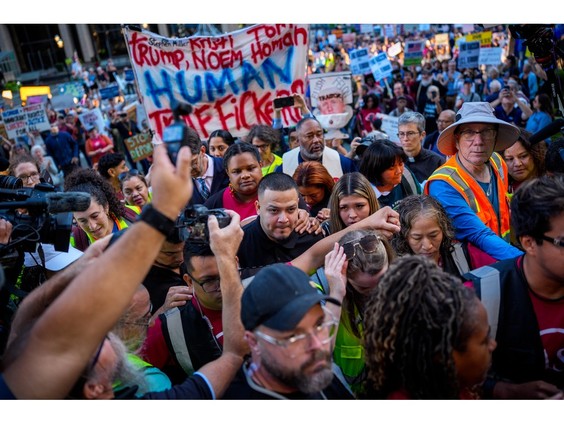World
U.S. Economy’s Vital Dependence on Immigration Exposed

As the debate surrounding immigration intensifies, the crucial role of immigrants in the U.S. economy has come under scrutiny. Randy Essex, a veteran journalist, highlights this dependency in his recent reflections on the current immigration climate under the administration of former President Donald Trump. Essex emphasizes that the ongoing crackdown on illegal immigration threatens not only the rights of individuals but also the very fabric of the U.S. economy.
The current immigration policies have fostered an environment where U.S. border agents are empowered to seize and search electronic devices, raising concerns about civil liberties. American citizens have reported being detained at border crossings, including those between Detroit and Windsor. Essex notes that these actions disproportionately affect nonwhite individuals, prompting fears about the erosion of rights that have historically defined American values.
Economic Impact of Immigration Policies
Essex draws attention to the historical context of immigration in the United States, stating that the nation has long relied on inexpensive labor to fuel its economy. From the exploitation of African slaves to the employment of immigrant laborers in the construction of railroads, the trend continues today. He points out that immigrants—many of whom work in essential roles—are vital to industries such as agriculture, construction, and hospitality.
The author highlights that approximately 8.3 million workers in the U.S. are undocumented, constituting 5.2% of the labor force. The dependence on immigrant labor has become increasingly evident, with various sectors struggling to find American workers willing to take on low-paying, labor-intensive jobs. Essex recalls his experience in a small Colorado news operation, where about a third of the workforce comprised immigrants crucial to local economies.
As the Trump administration’s policies have escalated, the potential for economic downturn becomes more pronounced. Essex warns that if any significant portion of these undocumented workers were to be deported, the U.S. could face a deep recession.
A Call for Comprehensive Reform
The solution, according to Essex, lies in the hands of Congress. He advocates for a bipartisan effort to improve immigration law enforcement, adequately fund immigration courts, and establish a realistic path to legal residency and citizenship. This approach echoes the comprehensive immigration reform that took place in 1986 under former President Ronald Reagan, which granted amnesty to 3 million undocumented immigrants in recognition of their economic contributions.
Essex’s reflections serve as a reminder that the path forward requires an understanding of the essential role that immigrants play in the U.S. economy. Without addressing the flaws in the current immigration system, the nation risks suffering economic consequences driven by outdated perspectives on race and labor.
As discussions around immigration reform continue, it is clear that a balanced approach is necessary to protect both the rights of individuals and the economic interests of the nation. The ongoing debate highlights the need for a renewed commitment to the values that have historically made America a land of opportunity for all.
-

 Politics4 weeks ago
Politics4 weeks agoSecwepemc First Nation Seeks Aboriginal Title Over Kamloops Area
-

 World5 months ago
World5 months agoScientists Unearth Ancient Antarctic Ice to Unlock Climate Secrets
-

 Entertainment5 months ago
Entertainment5 months agoTrump and McCormick to Announce $70 Billion Energy Investments
-

 Science5 months ago
Science5 months agoFour Astronauts Return to Earth After International Space Station Mission
-

 Lifestyle5 months ago
Lifestyle5 months agoTransLink Launches Food Truck Program to Boost Revenue in Vancouver
-

 Technology3 months ago
Technology3 months agoApple Notes Enhances Functionality with Markdown Support in macOS 26
-

 Lifestyle3 months ago
Lifestyle3 months agoManitoba’s Burger Champion Shines Again Amid Dining Innovations
-

 Top Stories2 months ago
Top Stories2 months agoUrgent Update: Fatal Crash on Highway 99 Claims Life of Pitt Meadows Man
-

 Politics4 months ago
Politics4 months agoUkrainian Tennis Star Elina Svitolina Faces Death Threats Online
-

 Sports5 months ago
Sports5 months agoSearch Underway for Missing Hunter Amid Hokkaido Bear Emergency
-

 Politics5 months ago
Politics5 months agoCarney Engages First Nations Leaders at Development Law Summit
-

 Technology5 months ago
Technology5 months agoFrosthaven Launches Early Access on July 31, 2025





















